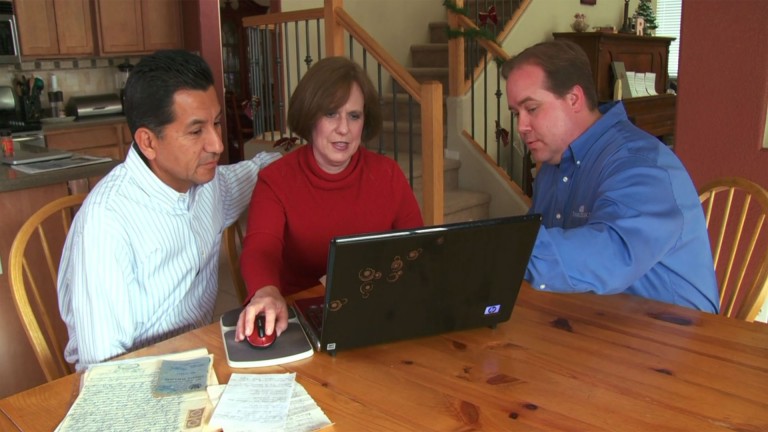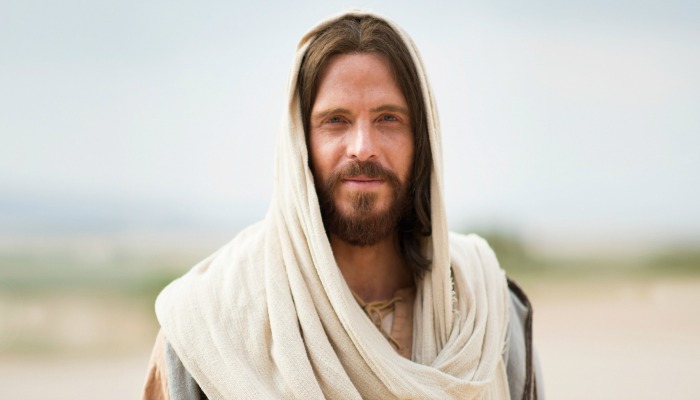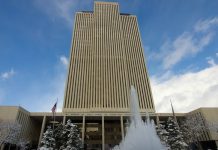
Brigham Young said: “If you cannot provide for your natural lives, how can you expect to have wisdom to obtain eternal lives? … The religion of Jesus Christ is a matter-of-fact religion, and taketh hold of the every-day duties and realities of life.”
Presiding Bishop Gérald Caussé explains, in an address at the 2018 Church History Symposium, four principles that have become guidelines in the Church’s financial resources.
First Principle: The Law of Tithing
 Tithing is when Church members give one-tenth of their income to the Lord through their Church in donations.
Tithing is when Church members give one-tenth of their income to the Lord through their Church in donations.
“The law of tithing was received that day as a commandment from the Lord, the reestablishment of a divine law which had been observed in times past by the people of Israel. It was a sign of the covenant made by the Lord with His people—that if they remained faithful to it, He would bless them both spiritually and temporally. Today, the law of tithing continues to be an essential practice of Latter-day Saints, regardless of where they live, their social standing, or their material circumstances. It is also the foundation of the financial stability of the Church” (In the Lord’s Way: The Spiritual Foundations of Church Financial Self-Reliance).
In regards to how the tithing should be used,
“The Lord clarified the manner in which the utilization of tithing should be approved and administered. He declared: ‘It shall be disposed of by a council, composed of the First Presidency of my Church, and of the bishop and his council, and by my high council; and by mine own voice unto them, saith the Lord.’ The ‘bishop and his council’ and ‘my high council’ referred to in this revelation are known today as the Presiding Bishopric and the Quorum of the Twelve Apostles, respectively.”
The First Presidency meets on every Friday in December to “examine and approve” the funds for the next year.
President Hinckley added: “The money the Church receives from faithful members is consecrated. It is the Lord’s purse. … The funds for which we are responsible involve a sacred trust to be handled with absolute honesty and integrity, and with great prudence as the dedicated consecrations of the people. We feel a tremendous responsibility to you who make these contributions. We feel an even greater responsibility to the Lord whose money it is.”
By policy, sacred tithing funds are approved and appropriated to support the spiritual and religious mission of the Church.
Second Principle: Self-Reliance and Independence
 “The prophet Brigham Young very quickly recognized the importance for Latter-day Saints to become a self-sufficient people and understood the strength they would draw from being independent both temporally and spiritually. He stated: “The responsibility to take care of ourselves and our families is an important practical application of the gospel. I have tried continually to get these people to pursue a course that will make them self-sustaining, taking care of their poor, the lame, the halt and the blind, lifting the ignorant … bringing them together from the four quarters of the world, and making of them an intelligent, thrifty and self-sustaining people.”
“The prophet Brigham Young very quickly recognized the importance for Latter-day Saints to become a self-sufficient people and understood the strength they would draw from being independent both temporally and spiritually. He stated: “The responsibility to take care of ourselves and our families is an important practical application of the gospel. I have tried continually to get these people to pursue a course that will make them self-sustaining, taking care of their poor, the lame, the halt and the blind, lifting the ignorant … bringing them together from the four quarters of the world, and making of them an intelligent, thrifty and self-sustaining people.”
Bishop Gérald Caussé goes on to explain that agency is important in this principle. And that personal agency is a gift from God. By becoming self-reliant temporally and spiritually, God’s children progress in their ability to make choices independently and thus fulfill the measure of their creation.
President Gordon B. Hinkley says,
“I urge you … to look to the conditions of your finances. I urge you to be modest in your expenditures; discipline yourselves in your purchases to avoid debt to the extent possible. Pay off debt as quickly as you can, and free yourselves from bondage. This is part of the temporal gospel in which we believe. May the Lord bless you to set your houses in order. If you have paid your debts, if you have a reserve, even though it be small, then should storms howl about your head, you will have shelter for your [families] and peace in your hearts.”
Bishop Gérald Caussé goes on to explain the Church’s self-reliance program,
“In the past few years, the Church has made an extraordinary effort to develop a program to strengthen member self-reliance throughout the world. The purpose of this initiative is to teach members the spiritual principles of self-reliance and to help them, in a practical manner, to improve their education, find employment, start their own businesses, and strengthen the management of their family finances. In 2017, 163,000 individuals completed these courses and started along the pathway towards self-reliance.”
Third Principle: Provident Living
 “Today’s Church members are conscious of the fact that they live in a period of calamities, caused both by human actions and the furies of nature. The prophecies about the last days are unequivocal, and there is great wisdom in preparing for the future—whether it be for possible famine, disaster, financial depression, or any other unforeseen adverse circumstance.
“Today’s Church members are conscious of the fact that they live in a period of calamities, caused both by human actions and the furies of nature. The prophecies about the last days are unequivocal, and there is great wisdom in preparing for the future—whether it be for possible famine, disaster, financial depression, or any other unforeseen adverse circumstance.
“As it was during that remarkable pioneer era, Church leaders have frequently counseled members to practice provident living by establishing home storage, including extra water, basic food items, medications, clothing, and other supplies that could be needed in case of emergency. Members have also been counseled to “gradually build a financial reserve by regularly saving a portion of [their] income.
“This same principle of temporal preparation has also been applied at the general Church level. For example, grain silos and warehouses filled with basic emergency necessities have been established throughout North America. The Church also methodically follows the practice of setting aside a portion of its revenues each year to prepare for any possible future needs.
“The moneys set aside are then added to the investment funds of the Church. They are invested in stocks and bonds; majority interests in taxable businesses (some of which date to the Church’s early Utah history); commercial, industrial, and residential property; and agricultural interests. These invested funds can be accessed in times of hardship to ensure the ongoing, uninterrupted work of the Church’s mission, programs, and operations and to meet emergency financial needs. The funds can also be used to provide additional financial resources as needed to support Church growth as prophecy is fulfilled that the gospel of Jesus Christ will be taught and the Church established throughout the world.”
Fourth Principle: In the Lord’s Own Way
 Bishop Gérald Caussé shares this story as an insight into why he understands this principle.
Bishop Gérald Caussé shares this story as an insight into why he understands this principle.
“I gained an insight into this principle shortly after my call as a General Authority. I was invited to Church headquarters in Salt Lake City for several weeks of training. One morning I arrived early at my office and found a message asking me to go as quickly as possible to President Boyd K. Packer’s office.
“He greeted me with great kindness and invited me to sit down. To my surprise, he took a piece of paper out of his drawer and asked me to read it out loud. It was the second chapter of 1 Corinthians. After having listened to me read the entire chapter, President Packer thanked me and dismissed me without any further comment. As soon as I got back to my office, I reread the entire chapter, and then again, and then one more time.
“I wanted to identify what important message President Packer was trying to teach me. One verse, in particular, caught my attention: “That your faith should not stand in the wisdom of men, but in the power of God.” I realized that doing things in the Lord’s own way could not depend upon the wisdom of man but had to be accomplished through application of principles and actions that would access the power of God.
I came to understand the importance of this principle more fully a few years later when I was called to serve in the Presiding Bishopric of the Church. Fulfilling this calling in the Lord’s own way requires seeking and receiving revelation for both spiritual and temporal affairs.
“As a bishopric, we counsel together to study issues, making use of our personal backgrounds, experiences, and areas of expertise. But ultimately our decisions are made in the spirit of prayer and the constant seeking of revelation as to the Lord’s will.
“While we consider such things as macroeconomic indicators and financial analyses, our ultimate goal is to fulfill our responsibilities in a manner that will carry out the designs of the Lord and sacred mission of the Church “to invite all to come unto Christ.” This goal can only be achieved and implemented through inspiration and the power of His priesthood. Given the directive to do things in the Lord’s own way, this calling fills me with humility each and every day.”





